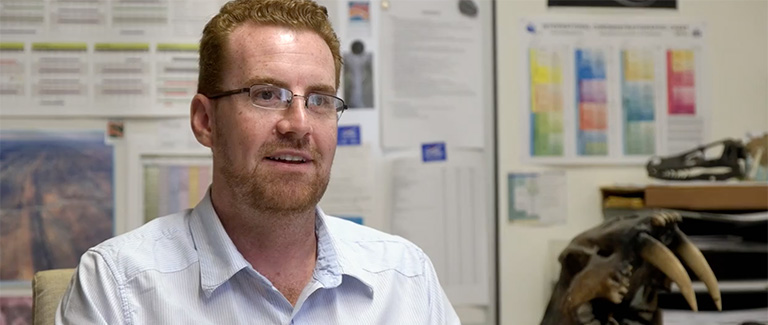Palaeontology
Palaeontology is the study of prehistoric life forms (or fossils) preserved in rocks and ancient sediments and the evolution of life on Earth. It is a multidisciplinary science, involving not only geology but also aspects of biology and chemistry. Students enrolled in various undergraduate courses (including non-scientific courses) can study palaeontology at UNE. This site will provide you with important information about the discipline at UNE, including undergraduate study and research.
Why Study Palaeontology at UNE?
The University of New England is one of only a few educational institutions in Australia that offers a coherent undergraduate program of study in palaeontology. UNE has a long history of palaeontological teaching and research and is conveniently located in the heart of the New England Fold Belt, providing an excellent natural laboratory for studying diverse and abundant Palaeozoic (542-251 million year old) fossils.
What makes studying palaeontology at UNE unique is that we offer our subjects in external mode, allowing students to study from home, no matter where you live in Australia, or indeed, the world! This is often ideal for students who work part-time or full-time. This study mode is achieved through the world wide web as each of our subjects has its own personalised website, with access to all necessary subject materials, e.g., readings on eReserve. The websites also include discussion boards to promote interaction between students and academics, as well as a facility to submit assignments electronically. The practical components of our subjects, e.g., lab classes and lectures, are conducted during residential schools.
UNE is also an excellent academic environment for students to conduct palaeontological research at various levels, e.g., Honours, Masters and PhD. Academic and Honorary staff members within Earth Sciences at UNE are highly qualified and respected researchers in their related fields, especially Mesozoic and Cenozoic vertebrates (including dinosaurs, megafauna and hominids), Palaeozoic invertebrates, plus a range of microfossil groups. Research projects can be tailored to individual students and may be theoretical and/or field/collection-based. Students may wish to choose field sites that are local, interstate or overseas. UNE is also well equipped with modern research facilities (see 'Facilities' below).
Bachelor of Arts/Bachelor of Science Bachelor of Science with Honours Graduate Certificate in Environmental Science Doctor of Philosophy UNE offers the following undergraduate palaeontology (or palaeo-related) units: Graduates with palaeontological training can gain employment in a variety of workplaces and have a wide range of career paths to choose from. Areas of employment include: UNE is well equipped for palaeontological teaching and research, with modern teaching laboratories (including a large palaeontological teaching collection) and research facilities. For information on our research activities, please visit the pages of the Earth Science Research Group and the Palaeoscience Research Centre.Undergraduate
Bachelor of GeoScience
Bachelor of Environmental Science
Bachelor of Science - Palaeobiology combined major
Bachelor of Science/Bachelor of Laws
Diploma in The SciencesBachelor Honours
Postgraduate Coursework
Graduate Diploma in Science
Master of Environmental Science and Management
Master of Scientific Studies Postgraduate Research
Master of Environmental Science
Master of Science
Contacts
For general and administrative enquiries, AskUNE.
Enquiries about studying palaeontology at UNE can be made to:
Professor John Paterson
Phone: +61 2 6773 2101
Email: jpater20@une.edu.au
Dr Phil Bell
Phone: +61 2 6773 2329
Email: pbell23@une.edu.au


